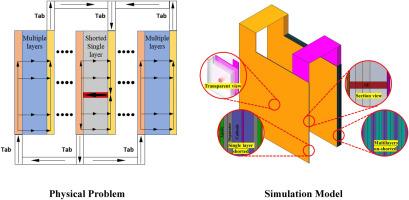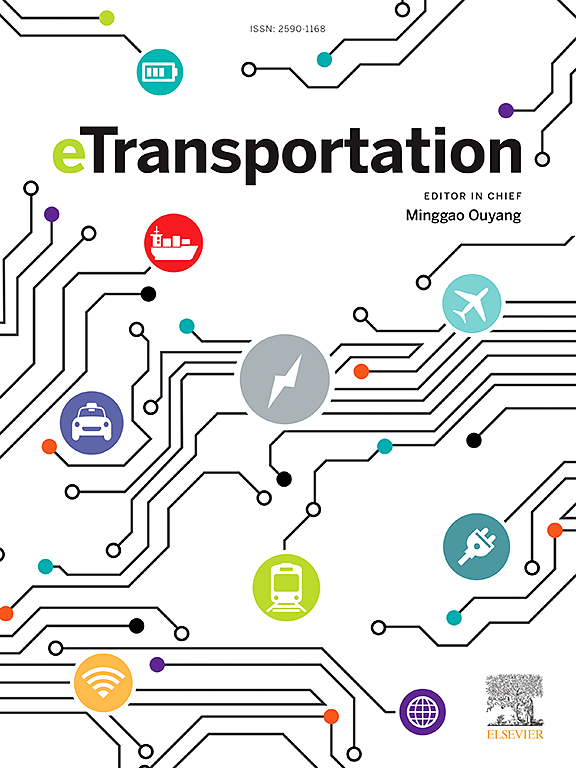无阳极电池单层内部短路模拟
IF 17
1区 工程技术
Q1 ENERGY & FUELS
引用次数: 0
摘要
能够实现高能量密度目标的锂金属电池技术存在严重的安全隐患,容易起火/冒烟,导致电池故障。在所有起火原因中,内部短路(ISC)是最常见的。内部短路安全测试被认为是电池设计的关键检查点,但目前的测试,如钉子穿透和球压痕,在宣布电池安全方面缺乏确定性和可重复性。鉴于这些实验局限性,我们提出了一种经过实验验证的 ISC 模拟方法,该方法可以阐明 ISC 的基本机制。该实验/模拟方法将短路单层与未短路层隔离开来,有助于仔细研究 ISC 和热失控 (TR) 现象。与其他针对整个电池组的三维电化学热耦合(ECT)ISC 仿真相比,本 ISC 模型灵活且计算成本低廉。我们展示了无阳极电池 ISC 模拟的端电压、短路电流、短路电阻、内部温度和其他衍生参数的实验验证。最后,我们利用仿真模型对无阳极电池(AFB)进行了参数研究,并仔细研究了电池设计和短路参数对 ISC 的影响。本文章由计算机程序翻译,如有差异,请以英文原文为准。

Simulation of single-layer internal short circuit in anode-free batteries
The lithium metal battery technologies that can fulfil the high energy density goal have grave safety concerns and lead to fire/smoke, leading to battery failure. Out of all the causes of fire, internal short circuits (ISC) are the most common. The ISC safety test is considered a crucial checkpoint for battery design, but the present tests, like nail penetration and ball indentation, lack certainty and reproducibility in declaring battery safety. In light of these experimental limitations, we present an experimentally validated ISC simulation method that can elucidate fundamental mechanisms underlying ISC. The experimental/simulation method isolates the shorted single-layer from the unshorted layers, which helps in scrutinizing ISC and thermal runaway (TR) phenomenon. The present ISC model is flexible and computationally inexpensive compared to other 3D electrochemical thermal coupled (ECT) ISC simulations for a whole battery pack. We show the experimental validation of terminal voltage, short-circuit current, shorting resistance, internal temperature and other derived parameters of an ISC simulation of anode-free cell. Finally, the simulation model was used to do a parametric study for an anode-free battery (AFB) and the effect of cell design, and shorting parameters on ISC was scrutinized.
求助全文
通过发布文献求助,成功后即可免费获取论文全文。
去求助
来源期刊

Etransportation
Engineering-Automotive Engineering
CiteScore
19.80
自引率
12.60%
发文量
57
审稿时长
39 days
期刊介绍:
eTransportation is a scholarly journal that aims to advance knowledge in the field of electric transportation. It focuses on all modes of transportation that utilize electricity as their primary source of energy, including electric vehicles, trains, ships, and aircraft. The journal covers all stages of research, development, and testing of new technologies, systems, and devices related to electrical transportation.
The journal welcomes the use of simulation and analysis tools at the system, transport, or device level. Its primary emphasis is on the study of the electrical and electronic aspects of transportation systems. However, it also considers research on mechanical parts or subsystems of vehicles if there is a clear interaction with electrical or electronic equipment.
Please note that this journal excludes other aspects such as sociological, political, regulatory, or environmental factors from its scope.
 求助内容:
求助内容: 应助结果提醒方式:
应助结果提醒方式:


